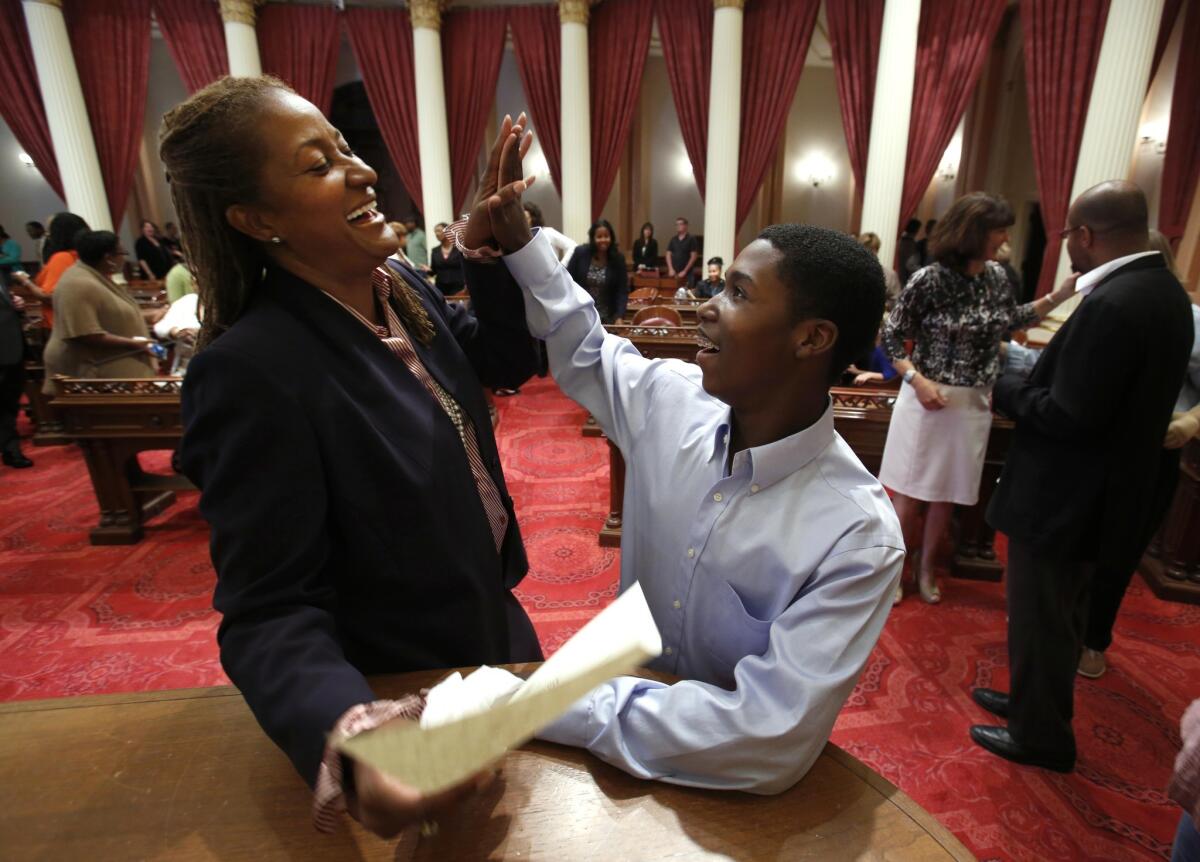Special elections: They mostly just waste money

Newly sworn-in state Sen. Holly Mitchell (D-Los Angeles) gets a high-five from her son, Ryan, 13, after she signed her oath of office at the Capitol in Sacramento.
- Share via
There was a special election in Los Angeles County last week. Didn’t know? Didn’t vote? Didn’t care?
Well, you’re in the majority. Less than 9% of registered voters in the 54th Assembly District bothered to show up at the polls or mail in ballots. Angelenos, a generally disunited bunch, coalesced around apathy. But what does it say about us that the one thing we can agree on is indifference?
The appalling turnout last week is a symptom of a much larger problem.
SOCAL POLITICS IN 2013: Some rose, some fell -- and L.A. lost its women, almost
Why did we even have a special election Dec. 3 in this district that includes Westwood, Ladera Heights, Culver City, Mar Vista and other neighborhoods in west and southwest Los Angeles? It was held to replace former Assemblywoman and current state Sen. Holly Mitchell.
Thanks to term limits, which were enacted as a political “reform,” politicians in Los Angeles and California play an endless game of musical chairs, hopping from one elected office to another, sometimes in the middle of their terms. Under the original term-limit law, legislators could serve a maximum of three two-year terms in the Assembly and two four-year terms in the state Senate, for a total of 14 years in the Legislature. A revision to the law passed last year allows legislators to serve a total of 12 years in the Legislature, with no restrictions on which house or houses the years are served in.
In the city of Los Angeles, council members are limited to three four-year terms, for a total of 12 years.
This has left us with a system in which elected officials are always positioning themselves for their next run rather than focusing fully on the job they have been elected to do. Legislators with knowledge and expertise are forced out of jobs where they are effective, and taxpayers end up spending a significant amount of money on special elections. Each time we call one of these low-turnout special elections to fill a seat vacated by a politician just elected to a new post, voter guides and ballots have to be printed and poll workers paid. Costs can be near $1 million per election.
So why did Mitchell leave the Assembly? Because she won her own special election in September to replace state Sen. Curren Price. And why did Price leave? He was elected to the Los Angeles City Council (where the winner of Tuesday’s contest, Assemblyman-elect Sebastian Ridley-Thomas, worked for him).
Had Price stayed in the state Senate, he could have served only one more four-year term. As a newly elected member of the Los Angeles City Council, he can serve, if reelected, for two more three-year terms. Price replaced another victim of “reform,” termed-out Los Angeles City Councilwoman Jan Perry.
And one more thing: When Price originally ran for the state Senate, he won in a special election held to replace current county Supervisor Mark Ridley-Thomas, who is Sebastian’s father. Mark Ridley-Thomas left the Senate a few years before being termed out of that position. Mark Ridley-Thomas ran for the Senate when he was able to run for only one more term in the Assembly, where he won office just as he was about to be termed out of his position as a member of the Los Angeles City Council.
Does this reflect poorly on the aforementioned politicians? Not in my book. When people want to serve the public and know they are soon to be forced out of their jobs, it is entirely rational for them to look to the next position. But just because a decision is rational doesn’t mean it serves voters, who are first robbed of a representative with expertise and then have to foot the bill for a costly special election.
Repealing term limits would solve the problem, but that is unlikely to happen. Members of the public don’t trust politicians and, more specifically, fear entrenched incumbents.
A partial solution would be to change the way we fill vacant legislative seats. As columnist George Skelton recently argued in this newspaper, we could empower the governor to fill vacant legislative seats. The governor himself is an elected representative, already responsible for dozens of important appointments. Allowing the governor to appoint legislators to fill vacancies would save the public the cost of special elections.
This proposal has its critics, who consider it undemocratic to invest such power in one person. But isn’t it an even bigger problem that representatives are elected in special elections by such a tiny percentage of those they represent?
Jessica A. Levinson is a professor at Loyola Law School, where she teaches election law, among other subjects. She blogs at PoLawTics.lls.edu. Twitter: @LevinsonJessica
More to Read
A cure for the common opinion
Get thought-provoking perspectives with our weekly newsletter.
You may occasionally receive promotional content from the Los Angeles Times.






